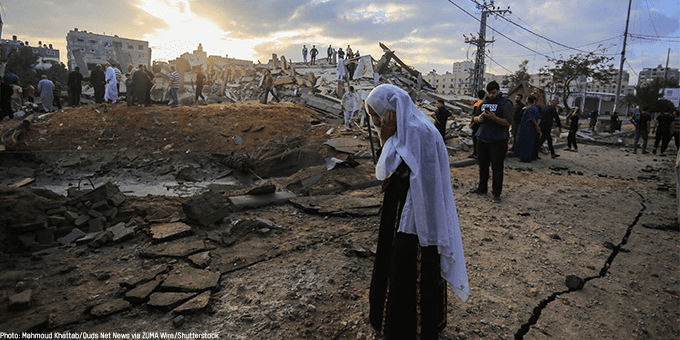
Oxfam said today that it cannot reach around 450,000 or more people in Gaza because of fighting and aerial bombardment. Oxfam staff are trying to resume their humanitarian and livelihood programmes with its network of partners but the destruction and indiscriminate threat to life make any emergency aid, at the moment, impossible to mount. The international agency should be providing food, clean water, sanitation and child protection support but the bombing is making it too dangerous for anyone to leave their homes.
An assessment by Oxfam’s water and sanitation team found that many water wells and pumping stations have been damaged by Israel’s bombardments. These facilities are the only way for people living in Gaza to get clean water and any disruption to them creates immediate distress. Authorities estimate that 40% of Gaza water supplies have been affected. People are struggling to secure any cash or income to support their basic needs, including for buying food, water, and medicines. Many have been forced to spend their savings or trying to sell assets. Many who have lost their homes have been forced into temporary shelters and, for now, humanitarian actors have not been able to set up systems to properly support them with food, water and sanitation facilities.
“We must remember that Gaza is in the midst of coping with the Covid pandemic too. People need access to water and medicines and hospitals to halt the virus spread and help nurse sufferers to recovery,” said Oxfam Country Director for the Occupied Palestinian Territory and Israel, Shane Stevenson. “Adding conflict on top of Covid feels like a recipe for disaster.” Oxfam has been providing hygiene kits for staff to use in Gaza’s two main isolation centres.
As much as 200,000 hectares of agricultural land has been bombed or is otherwise inaccessible to farmers now because of the danger of attack. Transport and movement around Gaza is not only unsafe but now made highly difficult because of the bomb damage to roads and debris from destroyed buildings. Some arterial routes are blocked entirely. Oxfam says that it could take weeks to start meaningful repairs and organise some recovery and resumption of normality for people in Gaza, even if a ceasefire was declared today.
“The situation is dreadful but – until the security situation improves enough to open up assessments and aid supply lines – things will quickly deteriorate much further,” Stevenson said. “Families are telling us that they are too scared to leave their homes for food and some have already run out of drinking water. Women and children have been maimed and killed. The scale of suffering is immense and yet we cannot respond properly. These aerial assaults have taken lives and any sense of safety, but they are also taking away people’s options to cope too – to buy food and supplies, and to go about their lives. The people of Gaza are psychologically exhausted and fearful and exposed. They need peace now in order to pick up the broken pieces of their lives.”
Oxfam calls for an immediate end to all violence. All parties must comply and adhere to their obligations under international humanitarian law. The international community must immediately work to put an end to both the current escalation of hostilities and the underlying human rights violations and systemic policies of oppression and discrimination which gave rise to it, including the Israeli occupation itself. Prior to this new escalation, Oxfam was already responding under a 14-year air, land and sea Israeli blockade rendering the Gaza Strip “unliveable”1 according to the UN whilst eighty percent of Gaza’s two million residents were already in need of humanitarian aid.
-ENDS-
For interviews, please contact:
David Bull
+64 274 179 724
david.bull@oxfam.org.nz



